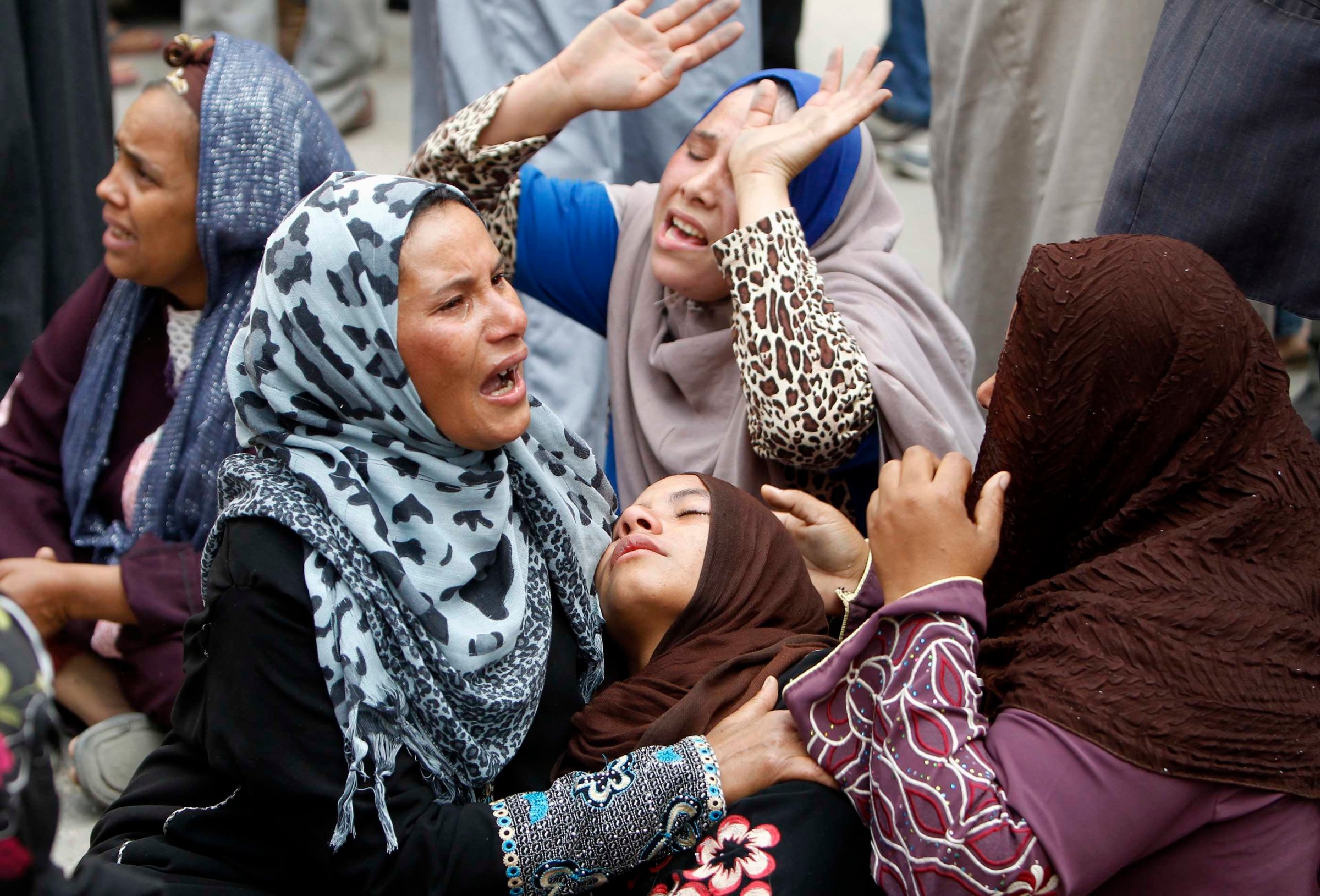
Correction appended, May 1 2014
Egyptians will go to the polls at the end of May to elect a president, but Monday brought a flurry of reminders that democracy is about more than what happens at the ballot box. The courts that are supposed to provide a check on executive power were showcasing their apparently complete alignment with Egypt’s security state.
The same Egyptian judge who last month sentenced to death 529 Muslim Brotherhood supporters condemned another 683 to the gallows in Minya, including the organization’s Supreme Guide, Mohamed Badie. Meanwhile, the Cairo Court for Urgent Matters banned the April 6 Movement, a grassroots organization instrumental in the 2011 revolution that Egypt’s military last year seized power ostensibly to protect.
The behavior of the Egyptian courts has given some observers cause for concern. “The reality is that on one side you have this legal system which is not fit for purpose,” says Massoud Shadjareh, chairman of the Islamic Human Rights Commission, a political advocacy group based in London. “Then you add the political pressures being borne on the judiciary, and you’re getting these sort of messages coming across… It’s absurd. The scale of the whole thing should bring fear into the international community.”
There was at least a hint that the global opprobrium that greeted last month’s mass sentencing may have had some impact. After condemning the 683 to death, the court revisited the 529 sentenced to death last month, commuting the sentences of all but 37 defendants to life in prison. But the convictions remained contaminated by the trial – a single day, with no defense allowed – as well as upstaged by the record-breaking mass sentence in the second case. “The judge did not give the lawyers any time to study the case,” says Ahmed Ban, an analyst for the Nile Center for Political and Strategic Studies and former Brotherhood member. “He didn’t listen to witnesses.”
Shadjareh notes that with Monday’s verdict, more than 1,100 Egyptians have been convicted for the death of a single policeman in Minya, while no security official has been charged for the more than 1,000 civilians killed across Egypt since the military dissolved the elected government dominated by the Brotherhood in July.
Both Minya trials grew out of riots that broke out across Egypt in August, after Egyptian forces mounted an assault on a Brotherhood sit-in on a Cairo street, killing hundreds. The massacre heralded a crackdown that appears to involve every major state institution, including courts which, even during decades of dictatorship, retained a reputation for independence.
During the rule of President Hosni Mubarak and his predecessors, Anwar Sadat and Gamal Abdel Nasser, “the judiciary sometimes acted as a brake on the government’s most authoritarian impulses,” Nathan J. Brown and Michelle Dunne of the Carnegie Endowment for International Peace recently wrote, “ Now, all the instruments of the Egyptian state seem fully on board. Whereas Nasser had to go to the trouble of setting up kangaroo courts, today there is no need.” Judges have outlawed the Muslim Brotherhood, the Palestinian militant group Hamas, and now the liberal April 6 Movement, named for the date of a planned 2008 public strike in an industrial town that grew into a nationwide protest movement.
Appeals against these rulings are theoretically available, but apparently are not to be attempted. A delegate from the online human rights group Avaaz was detained and deported earlier this month while trying to coordinate a meeting with Egypt’s Grand Mufti, the state official who must review every death sentence. The delegate carried a petition signed by 1.1 million people urging the Mufti to set aside the 529 death sentences.
“Look not at just what these cases mean individually, but what it means overall for Egypt,” says Sam Barratt, a spokesman for Avaaz.org. “Our deeper concern is what this means to the direction of Egypt, and what that could mean to the region for an increasingly disenfranchised group of individuals who have been shown no recourse but violence.”
Analysts say the fate of Badie, the Supreme Guide, may be crucial. If his sentence is carried out, Egyptian authorities will have executed the eighth holder of the office created by Brotherhood founder Hassan al-Banna, the Egyptian schoolteacher who established the organization as a grassroots effort to apply the imperatives of Islam to modern government.
The Supreme Guide holds nominal sway over Brotherhood branches in other nations, but his primary authority has been in Egypt, where for decades the group remained the only formidable organized opposition to the secular security state held in place by the nation’s powerful military. And indeed Badie and his aides in the Guide’s office at times appeared to govern Egypt jointly with Mohamed Morsi, the Brotherhood official narrowly elected president in 2012, under the banner of the Brotherhood’s Freedom and Justice Party, until the July 3 coup.
Morsi’s own trial is scheduled to resume May 6. The charges he faces include incitement to murder and insulting the judiciary. If Egypt’s courts carry on acting as they have done, the outcome is unlikely to be a surprise.
Correction: An earlier version of this story referred to the Islamic Human Rights Commission as a human rights group. The organization also operates politically, and has voiced support for the Lebanese militant group Hizballah.
More Must-Reads From TIME
- The 100 Most Influential People of 2024
- Coco Gauff Is Playing for Herself Now
- Scenes From Pro-Palestinian Encampments Across U.S. Universities
- 6 Compliments That Land Every Time
- If You're Dating Right Now , You're Brave: Column
- The AI That Could Heal a Divided Internet
- Fallout Is a Brilliant Model for the Future of Video Game Adaptations
- Want Weekly Recs on What to Watch, Read, and More? Sign Up for Worth Your Time
Contact us at letters@time.com